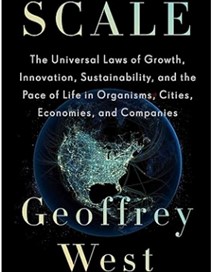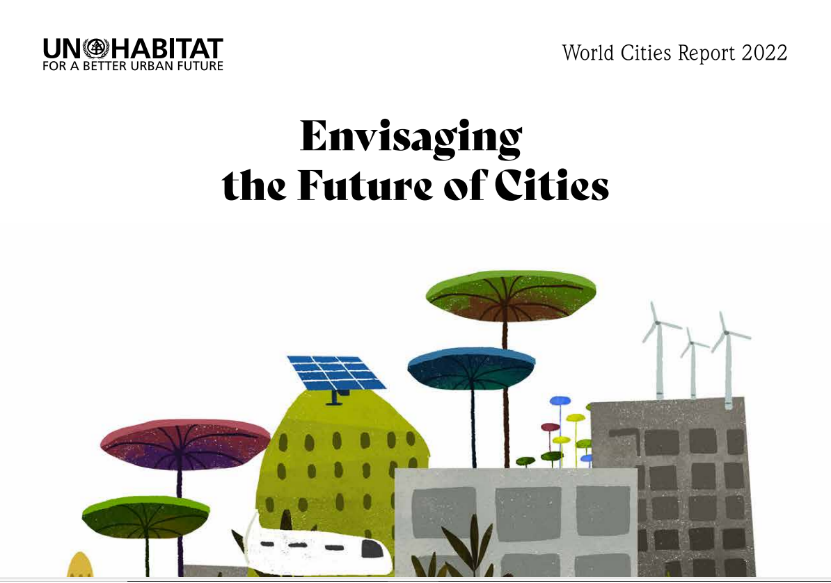Review of Scaling: Simple Laws for a Complex World
Yinghuan Chen
Geoffrey West is a theoretical physicist whose primary interests have been in fundamental questions in physics and biology. West is a Senior Fellow at Los Alamos National Laboratory and a distinguished professor at the Sante Fe Institute, where he served as the president from 2005-2009.In 2006 he was named to Time’s list of “The 100 Most Influential People in the World.”
Visionary physicist Geoffrey West is a pioneer in the field of complexity science, the science of emergent systems and networks. The term “complexity” can be misleading, however, because what makes West’s discoveries so beautiful is that he has found an underlying simplicity that unites the seemingly complex and diverse phenomena of living systems, including our bodies, our cities and our businesses.
Scaling is a highly illuminating and in-depth book that attempts to summarize a concise and unifying law for understanding the evolution, growth and demise of systems by observing how the properties of complex systems such as living organisms, cities and businesses change with their size, revealing the inner logic of all complex things. The author of this book, Jeffrey West, is the former director of the Santa Fe Institute, a world-renowned center for the study of complexity science. His deep experience in many fields, including theoretical physics, biology and urban enterprise, gives Scaling an interdisciplinary vision and provides a new way of thinking about exploring the complex world.
As the interactions between human society and the natural environment become increasingly complex, different systems - from microscopic molecular structures to macroscopic economic systems, social networks and even the entire Earth's ecosystem - exhibit unprecedented complexity and interconnectedness. This complexity is reflected not only in the diversity and non-linear interactions between elements within the system, but also in the dynamic equilibrium and feedback mechanisms between the system and the environment. In order to solve the problems facing human society, economic development and the protection of the natural environment in many areas, there is an urgent need to develop a set of theories suitable for the study of complex systems. Unlike the traditional research paradigm of physics, which is based on reductionism, the theory of complex systems is based more on macro-statistics. The 'law of scale' is one of the most classical laws of complex systems, which shows that almost any quantifiable feature in systems, from organisms to cities, from economies to corporations, has a quantifiable scaling relationship with scale. y=aX^b is a simple mathematical expression of the law of scale, which scales linearly when b=1, and non-linearly when b≠1. Non-linear scaling. In the real world, the properties of a system do not tend to change linearly as the system scales. values of b can make fundamental differences in the nature of the system. It can reveal the direction of evolution of a system and point directly to the ultimate life and death issues of the system.
The law of size was first observed in living organisms through scientists' detailed studies of the relationship between the physiological characteristics of different organisms and their body size. These studies revealed that organisms have some quantitative and predictable relationship with their body size in a number of ways, including growth, metabolism, energy expenditure, reproduction and survival strategies. For example, Kleiber's Law was proposed based on the measurement and analysis of the basal metabolic rate in organisms of different body weights, which was found to be proportional to the 3/4 power of body weight. These discoveries allowed scientists to understand the limits of organism size and lifespan, and greatly advanced the fields of ecology, physiology and evolutionary biology.
With the development of systems science and the advancement of big data technology, scholars in the field of urban science have also gradually paid attention to the existence of the law of scale. They found that the city as a complex system, its population, economy, transportation, environment and other aspects of the indicators, with the expansion of the city's size and show a kind of quantitative and predictable relationship. Specifically, there is a power law relationship between the city's innovation capacity, productivity, traffic congestion, pollution and other indicators and its population size. This power law relationship reveals the inherent law of urban development and provides an important reference for urban planning, policy making and urban management.
Similarly, the law of scale reveals the rise and fall of companies. The size of a company is closely related to its operational efficiency, market influence and ability to acquire resources. Generally speaking, as the size of a company increases, its market share and brand influence tend to increase accordingly, but at the same time it will also face challenges such as increased management complexity and rising operating costs. In the blind pursuit of scale, some companies neglect the improvement of internal management, technological innovation and market adaptability, which ultimately leads to inefficiency, declining competitiveness and even extinction. The law of scale suggests that in the process of pursuing scale expansion, enterprises need to find a balance point to ensure the maximization of scale efficiency.
In the 21st century, the law of scale plays an important role in the service of the Grand Unified Theory of Sustainability. The Grand Unified Theory of Sustainability aims to explore how social systems and the natural biological world can co-exist in harmony and develop sustainably. There is a limit to scale within a given structure of productive life. In order to continue to grow with limited resources and avoid collapse, change, i.e. innovation, must occur. Through continuous paradigm-shifting innovations, such as the discovery of iron and coal on a large scale throughout human history, the invention of the steam engine, computers and, more recently, digital information technology, we have sustained perpetual growth. However, the beginning of each new innovation cycle is getting closer with time. We need to realize major innovations and move to new phases at a faster pace. The advent of the big data era has provided new tools and methods for a grand unified theory of sustainability, opening up new possibilities for revealing the deeper laws behind complex phenomena. However, there is also criticism that the law of scale may oversimplify the intrinsic mechanisms of complex systems and ignore the diversity and complexity between systems. In an article in Scientific American, the world's leading popular science magazine, John Horgan, a renowned science journalist, attacked the whole study of complex systems: the study of complex systems is unlikely to find useful general principles, and the prevalence of computer modelling has made complexity 'a science that has nothing to do with facts'. Nevertheless, these controversies have provided a direction for the refinement of the study of complex systems, and as an immature and emerging discipline it will continue to be refined through discussion and controversy.
Overall, Scaling is not only a theoretical work, but also a book of practical significance. By revealing the mystery of the law of scale, it opens up a new perspective and provides tools and methods for understanding the complex world. Scientists in the fields of urban planning, business management or environmental protection will find useful insights and references in this book.




